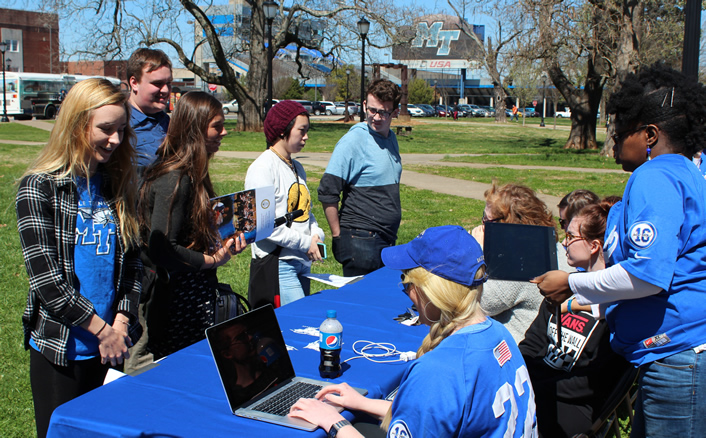Our story began in the summer of 2014. That summer, Middle Tennessee State University (MTSU) embarked upon two monumental tasks: the hiring of 47 fulltime college advisors and the adoption of data analytics software (the Student Success Collaborative – SSC). The reason: to increase retention and graduation rates. I was appointed to hire and train nine of these advisors that would serve the 11 departments in the College of Liberal Arts. Two years later, we found ourselves at an 84.9% retention rate for the 2015–2016 academic year, a 2.7% increase over the previous year and 2.9% over the university average.
How did we do it? Certainly, we did not become expert data analysts, but we were experts in a mindset that actually enjoys bringing together disparate parts to make a cohesive whole. We set out to integrate data analytics into our workflow, with our focus on the strengths of our liberal arts backgrounds.
What we discovered was a story I am excited to share.
Strength #1: A Strong Sense of Self
Believing that we must first know ourselves in order to best help our students, we started by identifying our own strengths. We took the Strengths Finder inventory and met with one of our management professors to examine the results. It was a telling moment as we stood in the “quadrant of our strengths” and looked around the room to see our coworkers, some of whom were idea people, while others were strategists, relators, empathizers. One was even a “wooer”! The naming of these traits was powerful; how they played out, even more powerful. Our strategists planned our events and kept us on track while our idea people brought energy, motivation and new ways of thinking.
We continued to hone our strengths with weekly meetings on Mondays where we set the priorities for the week, fed off each other’s ideas, connected as a team, and did periodic book studies. In addition, our break room hosted an idea board where advisors voiced their opinions, added new techniques, or posed questions.
Strength #2: Respect for Multiple Views
Our experience with students and faculty from 11 diverse disciplines offered us different perspectives, and challenged us to better understand our students and colleagues. An important part of the training process for my advisors, then, was visiting key classes and going to departmental meetings to grasp the perspectives of their disciplines. Exposure to these disciplines also encouraged us to ask the big questions, notice possibilities where others may not, and see how the pieces fit together. As a result, when students brought us a problem they had tried to solve with no success, we could often create solutions where none were thought to exist. Consulting notes in SSC also gave a valuable perspective as we saw what our faculty or other advisors had learned about the student who could offer great insight.

MTSU's Advising Tailgate, one of the student engagement activities planned by the university's advising team
Strength #3: Desire to Connect
From the physical framework of our space to the appointment service we used, we attempted to set up an environment in our center where students felt that they would be heard. This arrangement let our students know that we were available and they were our priority. In order to accomplish this, we instituted a number of changes:
- Students had access to our offices directly with a waiting area to use if we were busy.
- Our phone numbers were posted on our webpage along with our pictures.
- Our appointment service was accessible to students 24/7.
- All of our appointments were individual appointments.
Strength #4 Communication that Engages
Our goal in all communication, emails, notes, or one-on-one conversations was always to remember our audience:
- What would motivate the student to read/listen?
- What would another advisor need to know?
- How could I help the faculty member who will later see my student?
- What was the best method of communication for him/her?
Also, as a manager, I was able to use SSC biweekly to pull reports that allowed me to check the notes and reports of my advisors, making sure that we were all keeping our communication, consistent, clear and prompt.
Our story recently played out beautifully at a Nashville songwriter’s night. One of my advisors was there, and out of curiosity (and yes, he is the ‘wooer’ on our staff), he struck up a conversation with the songwriter to learn how he’d become a Grammy award-winning songwriter. The advisor was surprised to discover that the artist’s major area of study was history rather than music, and at MTSU! It was through the study of history that he found his voice and learned to be an authentic storyteller.
Helping our students find their voices and channel them into fulfilling careers is the best we can do for them. In the liberal arts, we have found that we do this best by knowing our own stories and leading from there. This approach has kept us happy to come to work, free to share our strengths, and fulfilled when we close the door at the end of the day.
Lucy Langworthy currently serves as manager in the College of Liberal Arts’ Advising Office at Middle Tennessee State University.
